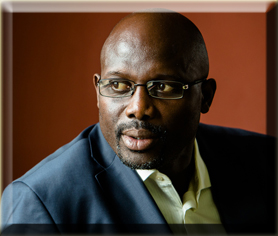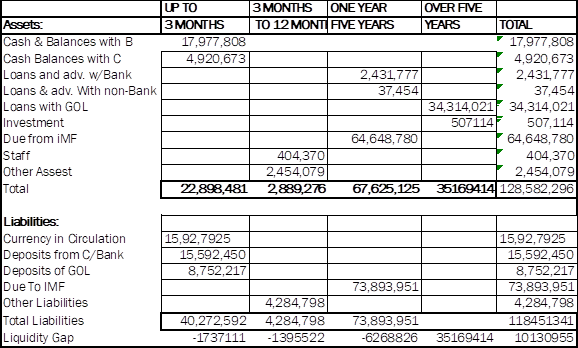Government: Turns “Bad Money” ($536M Loan) to Good Money?
 |
|---|
| President George Manneh Weah |
Have you heard the adage, which says, “The Tail Wags The Dog,” meaning the tail of a dog that drives flies away from a dog is the same tail that wags/slaps the dog? Or, the law that affects a citizen is the same law that affects a government. Without such a rule, the bank industry would enable criminals/drug dealers to change “Bad Money” to “Good Money.” In the case of the $536M, the banking rule that requires a depositor to provide a source for a deposit of $10,000 or above is the same rule that requires a government and its lender to provide the source for the $536M loan.
Forget about the source of Eton’s $536M Loan say the two Branches of the Liberian government and supporters. Following required and professional practice, prominent citizens and reputable institutions had called for the lender’s financial statements for two or three years and history of lending and borrowing. Interested parties, after visiting the Internet where corporations that do business with the general public send their relevant information, stated that the lender’s website was inactive until 2016 and that its listed assets were limited and minuscule to be in the position to lend such a loan. The Liberian Minister of Justice stated “…Some people say the people don’t have a website; will the money be sent through the web… Its benefits surpass petty consolidation.” A government supporter said “…there is nothing wrong even if Liberia were borrowing money from the devil,” according to Frontpageafricaonline.
LIBERIA’S SUBSIDIARY: CENTRAL BANK HAS NEGATIVE CASH FLOW

Source: Page # 34 of the 12/31/17 Audited Statements of the Central Bank of Liberia. Amounts are in 000’s of Liberian dollars.
If the Liberian government failed to get and or review its lender’s financial information, it could have reviewed their own banking institutions records: Liberia’s state-owned Bank, the Central Bank of Liberia’s audited financial statements from 2007 through 2017. The state-owned bank had reported negative cash position in each quarter of the five years. For instance, it reported negative cash position (i.e., the combined of the total cash and cash equivalents was less than the combined related liabilities) in each of these five years; (LD 2B) in 2013; (LD4.5B) in 2014; (LD7.5B); (LD16B) in 2016; and (LD17.3B) in 2017.
These negative cash positions imply that the state-owned bank used cash of commercial banks to pay government’s expenses. Relying on commercial banks’ cash to finance government’s operations does not support the argument made by many government officials that the lender would not try and seize Liberia’s natural resources as collateral in the event Liberia defaults on the $536M Loan. It might be true that the Loan Agreement included a provision that prevents the lender (i.e., Eton) from seizing any of Liberia’s assets at home, abroad and, or natural resources, and would take money from the country’s consolidated account; meaning CBL. Is there a difference between the Central Bank of Liberia, a state-owned entity and the state-owned natural resources? Is there any law, regulation, ruling and, or court case that prevents a legitimate lender from seeking any means to get justice?
I understand that some officials, realizing that this government has no money, will take money from the devil or criminal in order to finance programs. Therefore, the action to accept “Bad Money” should not surprise anyone, even though Liberia, in fact, has enacted its owned Anti-money Laundering Law in 2012, and revised in 2017. In March 2018, the Liberian Financial Intelligence Unit (FIU) held a three-day Workshop as part of its Mission to strengthen the government Anti-Money Laundering Law. At the three-day Workshop, the Director of FIU, Mr. Alex Cuffy reminded the audience that “…Liberia was considered weak in enforcing anti-money laundering…it came a time where only the multinationals, like Eco bank and United Bank of Africa, were able to transfer money,” which was not good for the country.
The million-dollar question is would a professional institution lend money to any borrower, especially, a deficit-ridden country, without a reasonable collateral? Would it lend money at an interest rate as low as, for example, 1.4%, since the interest rate might not generate profits? Also, a professional lending industry does not only seek profits from a country free from criminal activities, but it also lends money in order to enhance the operations of officials and chief executives. This is because efficient activities usually lead to economic expansion, thereby, creating an opportunity for the lender to generate more interest income. That is part of the reason why lenders usually investigate every borrower to ensure that it has the capacity and experience to efficiently employ its assets.
If Eton might not cover its cost on the loan, much more to enhance efficiency and promote growth within Liberia, what is the real reason behind the $536M loan? Well, please be aware of the lucrative businesses in the dark, where individuals or organizations turn “Bad Money” into “Good Money.” Drug dealers, for example, under the watchful eyes of the international community, would build or purchase a hotel with drug money (i.e., “Bad Money”). Subsequently, the hotel generates rental income (“Good Money”) from the hotel. Or, a commercial bank would allow a criminal to deposit $400,000.00, but divide the $400,000.00 into 50 deposits (i.e., $8,000.00 a deposit, thereby, not violating the $10,000.00 requirement).
If the Liberian Legislature were to approve the $536M Loan Agreement, guess what will happen? Liberia, in effect, would be sending the wrong message to criminals, commercial banks, and other institutions to forget about the Anti-money Laundering Act. Liberia will allow you to change “Bad Money” into “Good Money.” Subsequently, the country would have undermined its own Anti-money laundering laws and would have indirectly asked the international community to restrict Liberia’s financial activities. No country needs such a restriction, but it is necessary.
By J. Yanqui Zaza
